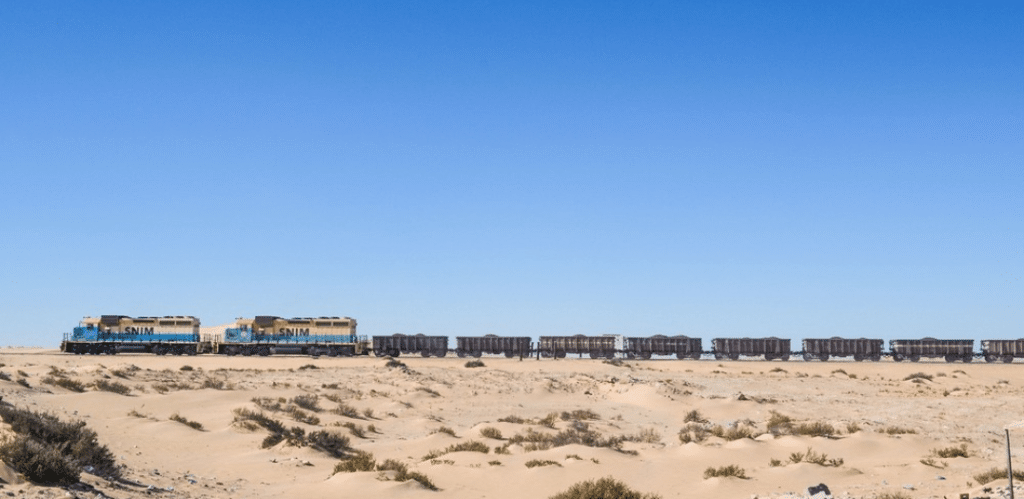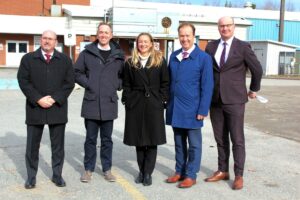By Jamie Hyland
Mauritania’s iron ore trains are one of the most iconic symbols of the country’s rich mineral wealth and industrial backbone. Stretching up to 2.5 kilometers, these massive trains carry iron ore 700 kilometers from the mines at Zouérat to the coastal city of Nouadhibou. Operated by the Société Nationale Industrielle et Minière (SNIM), Mauritania’s national industrial and mining company, the railway plays a critical role in the country’s economy, transporting up to 22,000 tonnes of ore per trip. For decades, these colossal steel serpents have not only been the lifeline for Mauritania’s mining industry but have also drawn adventurous travelers eager to experience a ride atop these formidable behemoths.
A Legacy of Iron Ore Production
Iron ore has been a cornerstone of Mauritania’s economy for decades, accounting for a significant portion of the nation’s exports and providing thousands of jobs. The mineral wealth of the region has allowed SNIM to become one of Africa’s leading mining companies, with the capacity to produce more than 12 million tonnes of iron ore annually. However, as the global steel industry transitions toward more sustainable and low-carbon production methods, the question arises: what does the future hold for Mauritania’s iron ore industry?
The Push for Renewable Energy and Green Hydrogen
While iron ore remains a key asset, Mauritania is looking to diversify and future-proof its economy by harnessing its abundant natural resources for renewable energy. The country’s vast open desert, strong coastal winds, and intense sunshine provide ideal conditions for solar and wind power generation. Recognizing this potential, the Mauritanian government has entered into a framework agreement with CWP Global to explore a new frontier: green hydrogen.
This ambitious plan aims to establish multi-gigawatt renewable energy production facilities, with the goal of building 8 GW of wind power and 12 GW of solar power. Once completed, these facilities could generate an estimated 110 terawatt-hours (TWh) of clean energy annually. The end game is to use this green power to produce up to 1.7 million tonnes of green hydrogen per year, positioning Mauritania as a key player in the global shift toward sustainable energy.
A New Era for Iron Ore?
But how does green hydrogen tie into the future of Mauritania’s iron ore trains and mining industry? The answer lies in direct reduction technology. Traditional iron ore production is a carbon-intensive process, requiring significant amounts of coal or natural gas to reduce iron ore into usable metallic iron. By utilizing green hydrogen instead, SNIM could transform its iron ore into hot-briquetted iron (HBI) through direct reduction, a process that emits almost no CO2. This could allow Mauritania to produce a higher-value product — clean HBI — which can be sold to steelmakers in Europe and beyond, while significantly lowering the carbon footprint of steel production.
This shift would not only create additional revenue streams for the country but also position Mauritania as a leader in sustainable mining and green metallurgy. Such a transformation would enable the country to capitalize on its iron ore resources while adhering to the global movement toward decarbonization, ultimately benefiting local communities through increased economic development and cleaner production practices.
Looking Forward
The iconic iron ore trains of Mauritania have long symbolized the nation’s wealth and industrial prowess. As the world pivots to greener technologies, Mauritania is seizing the opportunity to redefine its role in the global mining sector. With bold plans to harness renewable energy and create green hydrogen, the future of the country’s iron ore industry is set to become not just sustainable but transformative, paving the way for a new era of economic growth and environmental stewardship.
This article was published by: MiningIR
Visit the original article here



